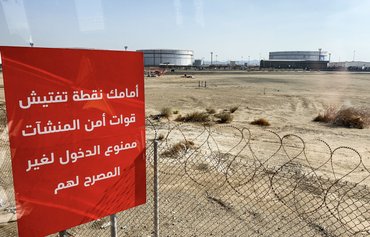The battle for the Yemeni province of Saada is heating up, military leaders said Thursday (April 5th), as the Arab coalition zeroes in on the area the Houthis (Ansarallah) have been using as a launchpad for firing missiles at Saudi Arabia.
The Iran-backed militia has launched a string of ballistic missile attacks on the kingdom, which shares a border with Yemen, from the northern province.
In the latest attack, the coalition said it shot down a missile late Wednesday fired by the Houthis, who said they had targeted storage tanks of Saudi oil giant Aramco in the border province of Jizan.
Hundreds of soldiers from Saudi Arabia and Sudan, both allied with the Yemeni government in its war against the Houthis, have arrived in the north to reinforce Yemeni troops deployed around Saada, Yemeni military officials said.
![A picture taken March 26th in Um al-Hammam district in Riyadh shows the pierced ceiling of a home hit by falling shrapnel from Houthi missiles intercepted over the Saudi capital the previous day. One Egyptian was killed by falling shrapnel. [Fayez Nureldine/AFP]](/cnmi_am/images/2018/04/05/12147-Riyadh-Houthi-missile-600_384.jpg)
A picture taken March 26th in Um al-Hammam district in Riyadh shows the pierced ceiling of a home hit by falling shrapnel from Houthi missiles intercepted over the Saudi capital the previous day. One Egyptian was killed by falling shrapnel. [Fayez Nureldine/AFP]
Prime Minister Ahmed Ben Dagher hailed the operation as "the end of Iran's confessional plans for Yemen, executed by its Houthi allies".
Tehran denies sending military supplies to the insurgents but has openly said it supports the Houthis' fight in Yemen.
According to sources in the Yemeni army, Yemeni and Arab coalition forces have advanced "several kilometres" towards the provincial capital of Saada since the reinforcements arrived.
Missile shot down
The Arab coalition said Thursday it shot down a missile fired by the Houthis, who announced on their Al-Masirah television channel they had targeted Aramco storage tanks in Jizan.
"The missile fired at the town of Jizan was intercepted and destroyed" late Wednesday, said coalition spokesman Turki al-Maliki.
"The debris fell on residential areas and we have no report of human losses or material damage," he said.
Aramco said its facilities in Jizan, in south-western Saudi Arabia, were "intact" and operating normally, after pictures were posted on social media of a fire sparked by a missile attack.
The Houthis have fired a barrage of missiles towards the kingdom in recent weeks, with Saudi forces on March 25th announcing they had intercepted seven missiles fired into the kingdom from Yemen by the Houthis.
One Egyptian national was killed in that attack by falling shrapnel.
The Houthis claim the attacks are in retaliation for Arab coalition air raids.
Threat to Red Sea navigation
Meanwhile, the Houthis continue to threaten international navigation in the Red Sea, said Yemen’s Minister of Local Administration and chairman of the Higher Relief Committee Abdul-Raqib Fateh.
He condemned the militia for its Tuesday targeting of a Saudi oil tanker off the Red Sea port of al-Hodeidah, describing the incident as "a terrorist act and a dangerous violation of international and humanitarian laws".
"The presence of armed Houthi militias at al-Hodeidah port turns it into a military rather than a relief port," Fateh said in reports carried by local media.
"The militias are using that port to threaten international navigation, regional and international security," he added.
He called on the UN to pressure the Houthis to hand over all ports and airports to the legitimate government.
"If Houthis continue to control the port, this will be a threat to more than 30% of international trade which crosses international waters," he said.
Incidents such as this harm international economy and trade, economist Abdul Jalil Hassan told Al-Mashareq.
"The international community needs to play its role in securing international trade routes parallel to coastal areas controlled by the Houthis," he said.

![Saudi soldiers reveal the remains of missiles the Arab coalition claims are Iranian during a press conference at the Armed Forces club in Riyadh on March 26th. [Fayez Nureldine/AFP]](/cnmi_am/images/2018/04/05/12146-Saudi-Iran-missiles-600_384.jpg)






May God safeguard the land of the two Holy Mosques and protect Muslims! Say Amen!
Reply5 Comment(s)
By God, I won’t be patient. The coalition has [gibberish] the people and burnt them. We have to strongly hit them. There should be no negotiations with them. By God, how patient you are.
Reply5 Comment(s)
The coalition can end the war in one day if they want. However, the reason why they’re late is that the Houthis are hiding among civilians and taking them as human shields. The Houthis know that the coalition has a strategy of not striking densely-populated areas. O, God, give victory to our brave soldiers, burn the Houthis and protect our country’s borders!
Reply5 Comment(s)
Is that real?!! You have been fighting for three years, and you have an Arab coalition, America and half of Yemen! Where's the Gulf Shield?! By God, you're real men!
Reply5 Comment(s)
More news.
Reply5 Comment(s)